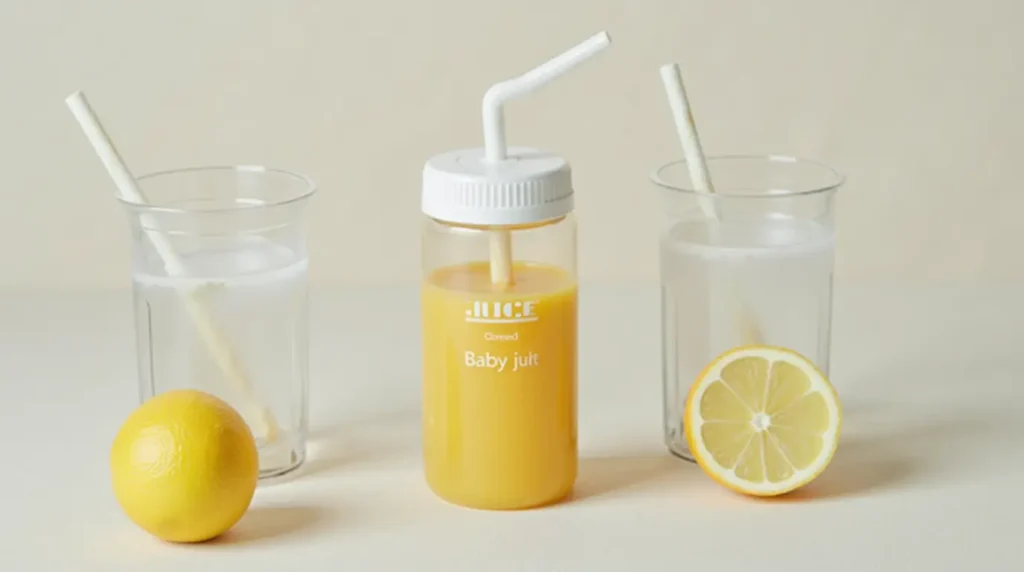Baby Juice 6 Months
Table of Contents
Introducing baby juice 6 months into your child’s diet can be an exciting yet confusing journey for parents. While breast milk or formula should remain the primary source of nutrition, small amounts of fresh and natural juice can provide added vitamins and hydration. In this guide, we will explore when and how to introduce juice to your baby, the best juice options, and precautions to keep in mind.
Is Baby Juice Safe at 6 Months?
Many parents wonder if baby juice 6 months is safe for their little one. According to pediatric guidelines, babies can start consuming small amounts of juice once they reach six months old. However, it’s crucial to ensure that the juice is:
- Diluted with water (to reduce sugar content)
- Fresh and homemade (to avoid preservatives and artificial flavors)
- Given in limited amounts (no more than 4 ounces per day)
For a more detailed comparison of different baby food options, check out our Yumi Baby Food Review.
Best Juices for a 6-Month-Old Baby
When selecting a juice for your baby, opt for natural and nutrient-rich options. Here are some of the best juices suitable for a baby juice 6 months diet:
- Apple Juice – Mild in flavor and gentle on the stomach.
- Carrot Juice – Packed with beta-carotene and vitamin A.
- Pear Juice – Helps with digestion and relieves constipation.
- Watermelon Juice – Hydrating and refreshing in small amounts.
- Orange Juice (only when diluted) – Provides vitamin C but may be too acidic for some babies.
How to Make Baby Juice at Home
Homemade baby juice is the best way to ensure freshness and avoid unwanted additives. Here’s a simple baby juice 6 months recipe:
Apple Juice Recipe
Ingredients:
- 1 medium apple
- 1/2 cup of water
Instructions:
- Peel and chop the apple into small pieces.
- Boil the apple in water until it becomes soft.
- Blend until smooth and strain to remove any pulp.
- Mix with additional water (1:1 ratio) before serving.

If you’re looking for a solid food option alongside juice, try our Cerelac Homemade Recipe for a nutritious baby meal.
Nutritional Benefits of Baby Juice
The right juices can provide essential vitamins and minerals to support your baby’s growth. Below is a table showing the nutritional benefits of different baby juices:
| Juice Type | Key Nutrients | Benefits |
|---|---|---|
| Apple Juice | Vitamin C, Fiber | Aids digestion, boosts immunity |
| Carrot Juice | Beta-carotene, A | Supports vision and skin health |
| Pear Juice | Potassium, Fiber | Helps with constipation |
| Watermelon | Hydration, C | Keeps baby hydrated |
| Orange Juice | Vitamin C, Folate | Strengthens immune system |
Tips for Giving Baby Juice
To ensure your baby gets the most benefit from juice without any negative effects, follow these tips:
- Always dilute juice with water.
- Serve juice in a cup rather than a bottle to prevent tooth decay.
- Limit juice intake to 4 ounces per day.
- Avoid giving juice close to bedtime.
- Opt for freshly prepared juice instead of store-bought varieties.
When to Avoid Juice for Babies
Although baby juice 6 months can be beneficial, there are times when it should be avoided:
- If your baby has a sensitive stomach or acid reflux.
- When experiencing diarrhea or digestive issues.
- If juice replaces breast milk or formula, which should remain the primary nutrition source.
First, if your baby is experiencing digestive issues such as diarrhea or an upset stomach, juice can worsen the symptoms. The natural sugars in juice, especially apple and pear juice, can have a laxative effect, leading to dehydration and discomfort. Instead, it’s best to offer breast milk, formula, or plain water to keep them hydrated.

Lastly, avoid giving juice before bedtime as it increases the risk of tooth decay. The sugars in juice can remain on the baby’s teeth overnight, leading to cavities. If juice is given, always follow up with water and proper oral care.
Conclusion
Introducing baby juice 6 months into your child’s diet can be a great way to enhance nutrition, but it should always be done carefully and in moderation. Stick to natural, diluted juices and ensure your baby continues to receive essential nutrients from breast milk or formula. By following these guidelines, you can make juice a healthy and enjoyable addition to your baby’s diet.

